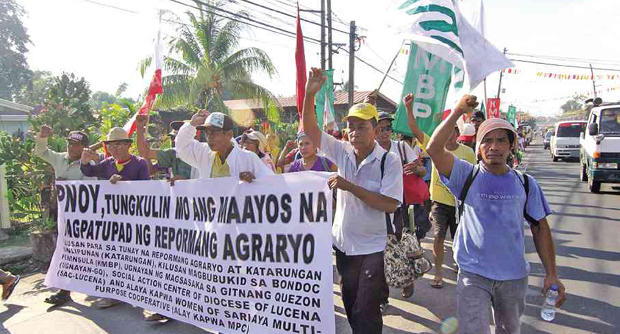Church to monitor land distribution under Carp

Quezon farmers march from Lucena City to Manila on Tuesday, June 3, 2014, to demand the completion of the government’s land reform program and the return of the coconut levy fund. DELFIN T. MALLARI JR./INQUIRER SOUTHERN LUZON
As the Comprehensive Agrarian Reform Program (Carp) expires on June 30, the Catholic Bishops Conference of the Philippines (CBCP) urged the dioceses to help ensure that the social justice program launched by democracy icon Corazon Aquino 26 years ago would serve its purpose.
In a statement titled “Moral Ethical Dimensions of the Comprehensive Agrarian Reform,” CBCP president Lingayen-Dagupan Archbishop Socrates Villegas said the Church will do its share to monitor the distribution of lands and ensure that they go to their intended beneficiaries, who in turn should make them productive.
“The Philippine Church must, with all haste and diligence, involve itself in the formation of our farmer-beneficiaries so that rather than devising ways of circumventing the law by alienating their holdings and contradicting the purposes of land distribution, they may be true stewards of this world’s goods,” said Villegas.
According to him, the government’s task does not end in distributing the lands but, more importantly, ensuring that the farmer-beneficiaries will get to enjoy their newly acquired property.
He stressed that distributing the expropriated land to beneficiaries and leaving them to their own resources does not serve the purpose of agrarian reform.
Article continues after this advertisement“Consigned to a state of uncertainty, this acreage cannot be productive, nor can the supposed beneficiaries enjoy the rights that the law intends them to have, this is a matter to which the Department of Agrarian Reform (DAR) must turn, with urgency and resoluteness,” said Villegas.
Article continues after this advertisementHe noted how many of the farmer-beneficiaries have been forced to abandon or even resell their newly acquired lands so that they can earn money out of these. He said many of the recipients of the lands do not have the means or skills to, on their own, make their lands productive.
“Some farmer-beneficiaries of agrarian reform have had to recourse to the subterfuge of alienating their newly acquired property in the underground market in an attempt to make quick money, frustrating the very purposes of land distribution,” said Villegas.
He cited the Agrarian Reform Communities’ Level of Development Assessment in 2011 which showed that 54 percent of households among agrarian reform beneficiaries fell below the poverty line.
“Due to this, we now have a class of newly landed Filipinos, the majority of which live below the poverty line. This is what prompts observers to recognize a new class of farmers: ‘the landed poor,’” he said.
According to the DAR, as of Jan. 1, they still need to distribute about 550,192 hectares out of the CARP balance of 1.2 million ha.
To address this problem, Villegas said a more responsible system of allocating, distributing and applying government funds and resources toward farm productivity must be set in place by DAR.
RELATED STORIES
Still landless farmers seek officials’ ouster
DAR chief urged to issue CARP notices of coverage immediately
Time running out on agrarian reform